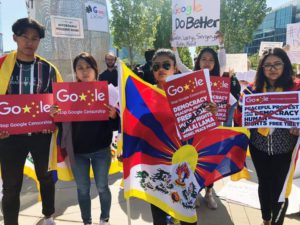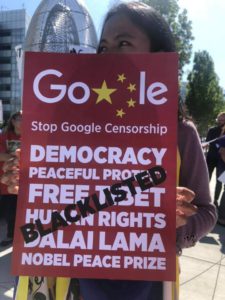Succes: Google dropt Dragonfly
Tibet supporters hebben met succes actie gevoerd tegen ‘Project Dragonfly‘. Google heeft bevestigd ‘geen plannen te hebben een zoekmachine in China te starten’. De plannen voor ‘Project Dragonfly’ lijken hiermee van de baan.

Na bijna 10 maanden campagne voeren, waren Tibetorganisaties heel opgelucht te horen dat Google op 19 juni 2019 bevestigd heeft op de aandeelhouders vergadering dat Google ‘ niet van plan is een zoekmachine in China aan te bieden’. Sundar Pichai, directeur van Google, zei afgelopen weekend dat ‘censuurvrij internet’ een belangrijke voorwaarde zou zijn om in China te werken (1).

Tibetanen, Tibet supporters, Chinese-en Oeigoerse rechtenactivisten hebben samengewerkt met specialisten in de digitale techniek, ethische consumentenrechten en verdere activisten (2) om Google onder druk te zetten ‘Dragonfly’ niet door te zetten, op basis van de waarde die het bedrijf zegt te hechten aan mensenrechten. De coalitie van activisten werd op een gegeven moment geïnformeerd over geheime plannen omtrent ‘Project Dragonfly’ in 2018, nadat het management van Google informatie lekte over deze zoekmachine. De informatie benadrukte dat ‘Dragonfly’ ontworpen was om Chinese internetgebruikers af te schermen van informatie over mensenrechten of democratie en om ‘gevoelige’ informatie te censureren; zoektermen als ‘free Tibet’, ‘Tiananmen protest, ‘Dalai Lama’.
Volgens de strikte internetbeveiligings regels van China zou Google een automatische opslag van de gebruikersactiviteiten moeten inbouwen die inzichtelijk zou zijn voor de Chinese overheid, wat de veiligheid van de gebruikers zou riskeren (3).

De verklaring dat ‘Project Dragonfly’ is stopgezet kwam op 19 juni 2019 tijdens de aandeelhouders vergadering van Google’s moederbedrijf Alphabet in San Francisco (VS). Tijdens de aandeelhoudersvergadering, heeft Sonamtso, Campaigns and Communications Director for Students for a Free Tibet, een verklaring afgelegd voor het bestuur en de aandeelhouders, die de zorgen benadrukte die Tibetanen en andere groepen naar voren hebben gebracht, over ‘Project Dragonfly’. In haar verklaring vertelde Sonamtso de Google executives en aandeelhouders: “I come from a country where people are imprisoned for using search terms that the Chinese government doesn’t like and considers “sensitive.” These human rights violations are real and Google must not be complicit. Frontline communities don’t have the luxury of waiting for all of your “hypotheticals” to turn into real risks for us. You have violated the trust that your customers place in you, and that is bad for shareholder value. Google’s willingness to collude with the government of China sets an extremely dangerous precedent for internet freedom around the world.”
Na deze verklaring beantwoordde Google directeur Global Affairs, Kent Walker, vragen over ‘Dragonfly’ door te bevestigen dat Google geen plannen heeft de genereerde zoekmachine te ontwikkelen. Verdere samenwerking met China kon hij niet uitsluiten.(4)
Eerder beantwoordde Google de vier brieven die aan Sundar Pichai, CEO, gestuurd werden over ‘Dragonfly’, niet. (5)
De zorgen over ‘Dragonfly’en de toenemende repressie van Tibetanen, Oeigoeren en Chinese dissidenten ten spijt, liet Google niet van zich horen. De onverschilligheid die Google aan de dag legde zorgde ervoor dat de activisten tot de aandeelhouders vergadering moesten wachten om leidinggevenden en aandeelhouders van Google rechtstreeks aan te spreken, en om te horen dat ‘Dragonfly’, in ieder geval voor dit moment, is afgeketst.
Buiten de vergaderzaal deelden Tibetanen flyers uit en knoopten gesprekken aan met aandeelhouders, om hen over de dagelijkse realiteit te vertellen waar Tibetanen in Tibet in leven, en de schending van de mensenrechten in Tibet die onder de Chinese bezetting plaatsvinden.
De groep SumOfUs bood een petitie aan, getekend door 86,000 mensen, waarin er bij Google CEO Sundar Pichai op werd aangedrongen toom een einde te maken aan ‘Project Dragonfly’.(6)
De acties in San Francisco waren onderdeel van pareen werewereldwijde dag tvan protest tegen ‘Dragonfly’. Wereldwijd werden voor Google kantoren acties gehouden op 19 juni. Bij zeker 15 Google kantoren waren protesten, zoals in Londen, Mumbai, New York, Parijs, Sydney en Toronto. (7)
John Jones, Campaigns and Advocacy Manager bij Free Tibet, zei: “After months of hard work, we are pleased to hear Google confirm that it has no plans to offer ‘Project Dragonfly’ in China. The Chinese Communist Party were never going to allow Google to reestablish itself in China without compromising everything positive about the Internet, from the privacy of users to free access to information. The secretive nature of the project suggests that on some level the company’s executives knew this. Thanks to the tenacity of those involved in the campaign, as well as the bravery of those Google employees who spoke out, the company has, at least for now, put these plans on hold. We will keep watch for future developments, but for the moment, it’s a time to celebrate”.
Mandie McKeown, Campagne Coordinator bij International Tibet Network zei: “This is welcome news for the Tibet freedom movement and for defenders of human rights inside Tibet, East Turkestan and China. We are proud to share this success with our allies and global Tibet Groups that have taken part in the campaign. We have been bolstered to see what we can achieve when we work together, but we will remain vigilant that Google does not renege on this position in the future. We will continue to press Google and other digital tech companies to maximise human rights policies and not bend to China’s influence.”
Teng Biao, Chinese mensenrechten-advocaat en activist, zei: “Just last week two million Hongkongers marched for their fundamental rights; the week before thousands of people around the world rallied to remember the atrocities of the 1989 Tiananmen Massacre, but because of China’s high-tech totalitarianism the majority of people living in Mainland China know nothing of these events. Google have done the right thing by stating it has “no plans” to provide technology to promote dictatorship.”
Peter Irwin, World Uyghur Congress Program Manager, zei: “Google’s recent response to sustained pressure illustrates that carefully targeted action from civil society can have a tremendous impact. It is not, however, time to take our foot off the gas. Widespread rights abuses continue to be facilitated by technology companies with no qualms working directly in support of mass surveillance, artificial intelligence and other programs designed to monitor and control the Chinese domestic population. It is incumbent upon the international business community to live up to clear human rights standards to actively avoid complicity in abuses.”
Sondhya Gupta, Campaign Manager at SumOfUs, zei: “We’re glad that growing pressure from its employees, shareholders and customers has forced Google to drop its plans for censored search engine for China. But its executives made this decision with no transparency or dialogue with those communities most affected. Google still claims to have a ‘limited presence’ in China and its failure to comment on the cyber surveillance aspects of ‘Dragonfly’ shows it’s still a long way from being accountable for the impact its products have on human rights. We’ll keep calling for the big changes the company needs.”
Bron: International Tibet Network
Notes:
(1) https://edition.cnn.com/2019/06/16/tech/google-china-ceo-sundar-pichai/index.html
Full details of the campaign can be found here: https://stopgooglecensorship.online/
(2) freetibet.org, studentsforafreetibet.org, tibetaction.net, uyghurcongress.org, sumofus.org and other Tibet groups from International Tibet Network, a global coalition of 170 Tibet related organisations and groups worldwide – tibetnetwork.org
(3) https://theintercept.com/2018/08/01/google-china-search-engine-censorship/
(4) https://m.youtube.com/watch?v=P7K_-m7sVBc
(5) https://tibetnetwork.org/google-where-is-your-response/
(6) https://actions.sumofus.org/a/google-cancel-project-dragonfly-1
(7) A Dropbox folder of images from protests on 19 June is available here: https://www.dropbox.com/home/2019%20Google%20AGM%20-%20Tibet%20Group%20Protest%20Images
